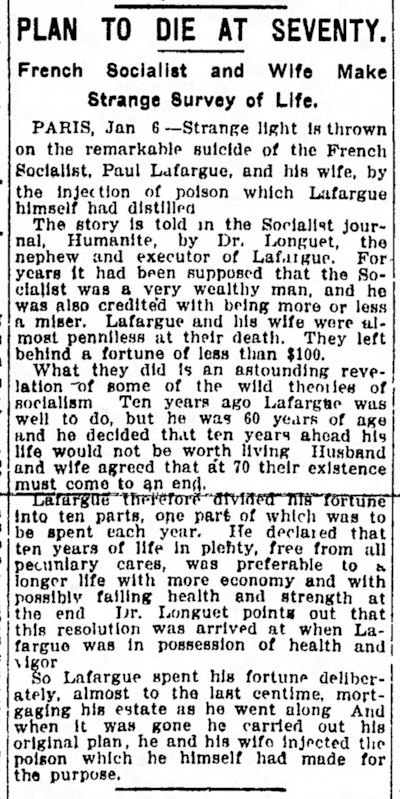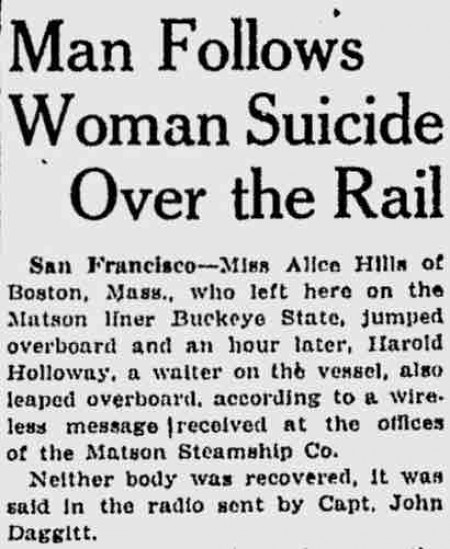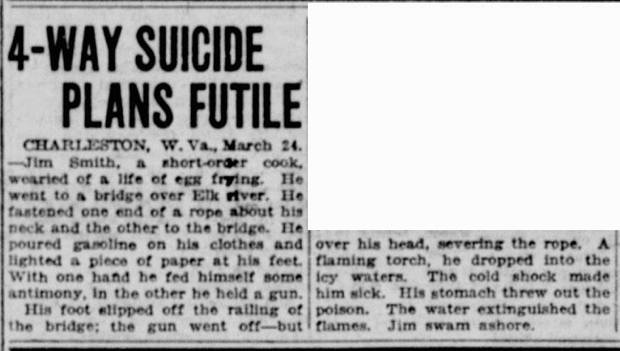Suicide
The Lafargue Retirement Plan
November 1911: Paul and Laura Lafargue were found dead in their home in Draveil, just outside of Paris. They had committed suicide by injecting poison. Laura was the daughter of Karl Marx. She was 66, and Paul was 69.It turned out that their suicide was the result of a ten-year plan. Or, at least, that's the story that circulated around. Ten years before, they had decided that they could either live ten years very well, or longer with more financial uncertainty. They opted for Plan A. So they mortgaged the house and divided up all they had into 10 equal parts and spent one part each year. When they had nothing left, they both took poison and checked out.

The Indianapolis Star - Jan 7, 1912
Posted By: Alex - Sat Apr 23, 2016 -
Comments (7)
Category: Death, Suicide, 1910s
Ship of Suicides


Original article here.
Posted By: Paul - Sat Apr 23, 2016 -
Comments (5)
Category: Death, Suicide, Oceans and Maritime Pursuits, 1920s
Tries suicide to escape persistent life insurance salesman
The present-day equivalent of this, I think, would be the feelings of desperation and rage that persistent telemarketers can cause. (Though thanks to caller ID, I just never pick up when they call, which is multiple times every day since the "do not call list" is apparently a complete farce.)
Kingsport Times - Apr 10, 1929
CONCORDIA, Kans., April 10 (AP) —Hoping to rid himself of a persistent life insurance agent, Walter Cyr, a young farmer, left a goodbye note to friends and then disappeared.
For three days he was sought in the vicinity of his farm home by hundreds of men and finally was located sitting on a straw stack. When searchers approached he swallowed a small quantity of poison but experienced no ill effects because of prompt medical attention.
Cyr said he had wandered about the countryside for 72 hours, attempting to nerve himself to suicide. He asserted he knew no other way to escape attentions of the insurance man who had been "bothering" him.
Posted By: Alex - Tue Jan 12, 2016 -
Comments (12)
Category: Annoying Things, Insurance, Suicide, 1920s
4-way Suicide
"Wearied of a life of egg frying," the unfortunate Jim Smith decided to end it all. But despite trying to torch, hang, poison, and shoot himself simultaneously, his plan didn't succeed.I'm skeptical that this ever happened. It sounds like the kind of thing reporters used to make up to pad newspaper columns. From The Seattle Star - March 24, 1922. (via Weird Shit in Historic Newspapers)

Posted By: Alex - Sat Sep 27, 2014 -
Comments (8)
Category: Death, Suicide, 1920s
Suicide Payoff
If you jump in front of a train, is it the train driver's fault if he doesn't stop in time to run you over? Maybe. Back in 1977, Milo Stephens tried to commit suicide in this way and later sued the New York City Transit Authority for running him over. The TA gave him a settlement payment of $650,000 rather than going to trial.A Time magazine article (Jan 9, 1984) explains why the TA opted for the settlement rather than fighting it:
Posted By: Alex - Mon Aug 04, 2014 -
Comments (11)
Category: Lawsuits, Suicide, 1970s
Suicide Machines
Created by artist Thijs Rijker. They're not machines that help people commit suicide. Instead, they're machines that slowly destroy themselves.One machine saws into its own structure, until eventually the saws will reach the engine. Another machine pours sand into its gearbox until the gears wear out.
Perhaps it's a metaphor for the planned obsolescence of modern consumer goods, which are designed to break down or wear out sooner rather than later, so that we constantly have to buy new stuff.
Posted By: Alex - Mon Oct 21, 2013 -
Comments (6)
Category: Art, Technology, Suicide
Suicide Note Writing Workshop
Taught by Simon Critchley, who explains that he intends it partially to be "a way of mocking creative-writing workshops." Full article at the New York Times:The suicide note, which he identified as a literary genre with a unique form, is a fairly recent invention coinciding with the rise of literacy and the press, he told the class.
“In antiquity, there was no need to leave a note,” he said. "It would have been obvious why you killed yourself."
Posted By: Alex - Mon May 20, 2013 -
Comments (6)
Category: Death, Suicide, Literature
Suicide by Crocodile

1990: A woman climbed the fence at the same crocodile farm, Samut Prakarn, and was swarmed by crocs as hundreds of tourists watched in horror. [LA Times]
1994: Following the death of President Felix Houphouet-Boigny of the Ivory Coast, a man declared that without the president life wasn't worth living and jumped into the crocodile-infested moat outside the presidential palace in Yamoussoukro. Crowds watched for two days as the crocs chewed on his body. [Glasgow Herald]
2002: Again at Thailand's Samut Prakarn croc farm, a depressed woman waded into the crocodile pit. A spectator later said, "The moment the crocodile grabbed her body, she even hugged onto him. It was horrifying." [The Nation]
2011: A South-African farm worker, depressed after a fight with his lover, waded into the crocodile-infested Lepelle river. No one saw him actually being eaten, but someone later reported seeing a human leg dangling out of a crocodile's mouth. [Daily Mail]
Based on these reports, it sounds like it can take up to 20 or 30 minutes before the crocodiles actually kill you. So it's not a particularly quick form of suicide. Also, I'm not sure if it would be blood loss or drowning that would finally kill you -- or perhaps a combination of both!
Posted By: Alex - Fri Sep 07, 2012 -
Comments (12)
Category: Animals, Death, Suicide
Mermaid Respect, Cow Suicide, Soothing Drum Circles, Plus the Urethra Is Not an Erogenous Zone
News of the Weird / Pro EditionAugust 31, 2009 (news from August 22-29)
[EDITOR'S NOTE: Yr Editor will not publish Pro Edition next week (but will return Sept. 14) (and the standard News of the Weird column never skips a week). This will not be a "vacation." I will be working furiously, shaping up yet another attempt to glide this News of the Weird franchise into the digital age. The task is frustrating, but let's face it: After all these years, and despite a stellar résumé and two professional degrees, I'm no longer qualified for anything except News of the Weird.]
Update: Looking More 'n' More Like Texas Executed a Slam-Dunk-Innocent Man
Cameron Todd Willingham got the needle in 2004 after jurors believed the expert who told them that the 1991 fire that killed his 3 babies just had to be arson. In the years since, a parade of prominent national fire scientists (the latest, last week), re-examining the evidence, have concluded that the Texas fire warden was fulla crap, that the fire was an accident. Sorry 'bout that, Cameron. (Fire marshals are not nearly the only Texas forensic "experts" to be found fulla crap.) Austin America-Statesman
"Yo, yo, yo, Shalom, y'all. 'Sup?"
Stand-up comic Sunda Croonquist (a black-Swede mix) married into a Jewish family in New Jersey and naturally started to weave the family circus into her act. Funny at first. No longer, they said. Ruth Zafrin and her daughter and son-in-law have actually filed a lawsuit against Sunda for defamation. [You're right; there're no lawsuits in comedy!] Associated Press via ABC News
British Kids Can Legally Buy Porn for the Next 3 Months . . .
Seriously. The gov't forgot to include its 1984 child-porn regs on the list of laws it filed with the European Commission, and a Fine Point of the law means the statute can't be enforced until the EC has been "consulted" about it for 3 months. Reuters
Don't Say Yr Editor Never Publishes Good News
A study of scans on 16- to 19-yr-olds revealed that marijuana use actually reduces the brain damage normally done by binge-drinking. (On the other hand, the researchers were all from UC San Diego, and results on non-California dope-users may differ.) KTVU (Oakland)
Update: The Rubber Room
Quick, now, which is the primary function of the school system? (a) that every child gets diligently-applied educational opportunities or (b) that every teacher gets diligently-applied due process from a 100-page, single-spaced union contract? You say (a)? ROTFL! The New Yorker checks in this week on the topic (addressed in NOTW a coupla times). It costs New York City more than $40m/yr to keep 600 teachers accused of terminable misconduct or incompetence on full salary awaiting hearings that by contract take 2 to 5 yrs to schedule and then typically last longer than capital-murder trials, plus $60m/yr more for 1,000 others whose schools closed but whom no other principal wants. The 600 "rubber-roomers" clock in every day and sit around getting even more pissed off (comparing themselves to Gitmo detainees). Their favorite victim phrase is "performance evaluations," as in "We don't need any." Said one rubber-roomer, "We can tell [by ourselves] if we're doing our jobs." The New Yorker
More in extended >>
Posted By: Chuck - Mon Aug 31, 2009 -
Comments (9)
Category: Suicide
Detergent Suicide
I posted last week about how Aokigahara Forest in Japan was a popular destination for those wishing to commit suicide. Another suicide fad in Japan is "Detergent Suicide," which involves gassing yourself by mixing common household chemicals:A few cases of Detergent Suicide in the US have experts concerned that the fad may be catching on over here.
An interesting article by sociologist Kayoko Ueno argues that suicide is actually one of the defining features of Japanese society (think of hara-kiri and kamikaze) and one of its major cultural exports:
Posted By: Alex - Tue Mar 24, 2009 -
Comments (16)
Category: Death, Suicide, Asia

| Who We Are |
|---|
| Alex Boese Alex is the creator and curator of the Museum of Hoaxes. He's also the author of various weird, non-fiction, science-themed books such as Elephants on Acid and Psychedelic Apes. Paul Di Filippo Paul has been paid to put weird ideas into fictional form for over thirty years, in his career as a noted science fiction writer. He has recently begun blogging on many curious topics with three fellow writers at The Inferior 4+1. Contact Us |





